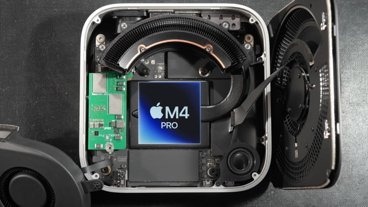Though the Cupertino-based Mac maker largely beat estimates for its second fiscal quarter on Wednesday, one sore spot appeared to be gross margin, which came in at about 100 to 200 basis points below most analysts' expectations at 32.9 percent.
An ensuing conference call was thus dominated by matter, as Wall Street folk routinely pelted management with questions on the perceived shortcoming as they sought a better understanding for their models going forward.
While management largely attributed the near 2 percent margin decline from the prior quarter to February's iPod shuffle price cut and a routine falloff in sales of Mac OS X Leopard and iWork, Piper Jaffray analyst Gene Munster offered his own explanation.
"We believe the margin outlook may be viewed negatively by investors, who likely wanted to see more of Apple's significant revenue upside trickle down to earnings," he wrote in a note to clients early Thursday morning. "The bottom line, we believe the margin was negativity impacted by a higher mix of Mac Book Air, which we now believe carries a lower margin."
On the bright side, Apple has likely built the potential for margin expansion into its MacBook Air design as adoption swells and component prices fall. What's more, Apple management appeared upbeat in stating that the Air has thus far shown little to no cannibalization effect on the company's other notebook offerings and thus could be considered largely responsible for helping push Mac unit growth to its highest rate in nearly two decades.
"The key takeaway from Apple's March quarter is that the Mac units grew at the highest year-over-year rates (units 51 percent and revenue 54 percent) in 17 years," Munster added in his note to clients. "Macs are the most meaningful category with the most potential and they are performing the best."
Looking ahead, the Piper Jaffray analyst said he's modeling conservatively for Mac growth rates to decline to 12 percent year-over-year for the remainder of calendar year 2008, which leaves "ample room for positive estimate revisions over the next 8 months."
"Mac growth is accelerating despite multiple quarters of strong growth, iPod sales are stabilizing with higher average-selling-prices due to the touch, and the iPhone will be significant in the second half of the year with the release of new hardware and software," he wrote.
 Slash Lane
Slash Lane






-m.jpg)






 Malcolm Owen
Malcolm Owen
 Amber Neely
Amber Neely

 Wesley Hilliard
Wesley Hilliard


 William Gallagher
William Gallagher









68 Comments
"The bottom line, we believe the margin was negativity impacted by a higher mix of Mac Book Air, which we now believe carries a lower margin."
On the bright side, Apple has likely built the potential for margin expansion into its MacBook Air design as adoption swells and component prices fall. What's more, Apple management appeared upbeat in stating that the Air has thus far shown little to no cannibalization effect on the company's other notebook offerings and thus could be considered largely responsible for helping push Mac unit growth to its highest rate in nearly two decades.
This shouldn't really be a surprise. Apple often launches with competitive prices. Then, as a product gets established increasing economies of scale benefits, and as component prices inevitably fall, the margin increases on its on. Apple gets their foot in the door first and then turns on the profit machine.
It is actually an amazing business model--they don't have to rase prices or cut quality to increase their margins. They just have to wait. Other computer makers cannot do this as they are essentially producing commodities--HP, Dell, Loveno et al have to keep cutting prices because they compete directly with each other. Apple, on the other hand, is somewhat removed and the competition is not as direct. Other makers can make a super-slim notebook, but few will be designed as well and none will run OSX...
'Course, it sucks for anyone who wants to buy a cheep super portable by Apple, but it should make the stock holders happy in the long run...
and the iPhone will be significant in the second half of the year with the release of new hardware and software," he wrote.
Patiently waiting with my moolah.
It is actually an amazing business model--they don't have to rase prices or cut quality to increase their margins. They just have to wait. Other computer makers cannot do this as they are essentially producing commodities--HP, Dell, Loveno et al have to keep cutting prices because they compete directly with each other. Apple, on the other hand, is somewhat removed and the competition is not as direct. Other makers can make a super-slim notebook, but few will be designed as well and none will run OSX...
'Course, it sucks for anyone who wants to buy a cheep super portable by Apple, but it should make the stock holders happy in the long run...
None of those brands necessarily make the cheap ultraportables either. A lot of the people begging for a cheap Air either confuse the Air with the EEE & XO, or confuse the Air with the $400 Walmart specials - both of which is completely silly. It seems much of it is driven by an indifference to what makes the Air a completely different class of device, as if it's just too subtle to them.
Except in terms of thickness, it's one of the largest laptops with a 13" screen that you can buy, no? I carry a bag that I've kept two other small notebooks in before. A Macbook Air wouldn't fit, though. I verified that by placing one atop the bag in the local Apple store.
And the border around the screen makes it look cheap.
I'd have bought it if they'd gotten it right, even for the insane current price, possibly. But thinness was apparently their only aim. I think they designed the ad campaign before they designed the product.
This shouldn't really be a surprise. Apple often launches with competitive prices. Then, as a product gets established increasing economies of scale benefits, and as component prices inevitably fall, the margin increases on its on. Apple gets their foot in the door first and then turns on the profit machine.
...
Maybe often , but certainly not always.
The initial release of a $600 iPhone completely negates your comments. How was that pricing competitive - only to drop $200 in less than 3 months?